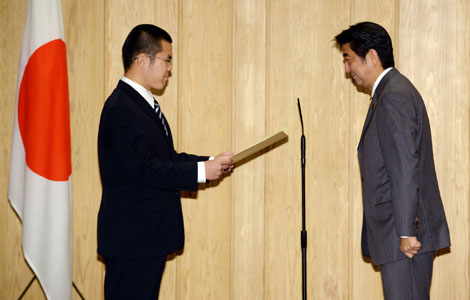

|
British writer David Mitchell's novel Cloud Atlas has attracted many readers in China. Murdo Macleod / For China Daily |
David Mitchell keeps his work fresh with unconventional structures and international flavor
The acclaimed writer David Mitchell says he had no idea that his books were popular in China - until he saw that his events in Beijing were well attended by readers, whose questions for him would range from literary queries to gossip.
On an author's tour of China earlier this month, Mitchell took part in two well-received discussions about the appeal and challenges of fiction with Chinese writers Xu Zechen and Li Er.
Mitchell's Man Booker Prize-nominated third novel Cloud Atlas has been turned into a film with a stellar international cast, featuring Hollywood luminaries such as Tom Hanks, Hugh Grant and Halle Berry as well as Chinese actress Zhou Xun. As a result, Mitchell is even more recognizable to Chinese readers, who were instantly charmed by his humor and humility when they met face-to-face.
"Back then there were many bicycles and few cars. Now there are many cars and few bicycles," he says, recalling his first trip to China as a backpacker in 1997.
"As a writer, everything I do and everywhere I go adds to the reservoir of raw material for my present and future books, especially this singular country."
Mitchell, 43, lives in Ireland with his Japanese wife and two children. An English native, he met his wife at 24; he would later move to Hiroshima and stay there for eight years. In 1997, he traveled through China via Hong Kong, Macao, Kunming, Sichuan, Beijing and Inner Mongolia. These travels formed the basis of the China chapter of his first novel, Ghostwritten.
"I went climbing in Emei Mountain with a Mandarin-speaking British friend. We met an old lady who explained about this magic tree in her courtyard that has different fruits on it. At the time, I thought she was mad. But later, I figured it was possible. She was the seed of the story."
Japan and Asia in general have been frequent topics in Mitchell's works. Ghostwritten featured Japan, Mongolia and China; Cloud Atlas envisions South Korea in the far future, and his latest book, The Thousand Autumns of Jacob de Zoet, portrays the 18th-century Japan. These novels, as well as Black Swan Green, are available in Chinese.
On his most recent trip to China, he visited Shanghai as part of his research for his next book. On Sina Weibo, China's largest Twitter-like service, he described the city as having a "skyline from a science-fiction movie, air warm and wet like hot shower gel".
Mitchell has written five novels at a fairly young age, two of which have been shortlisted for the Booker Prize, but he does not consider himself as someone who had been born with the ability to write long novels.
"When I started coaching myself to write, it seemed to be an enormous, huge, big wall that I couldn't climb over. I thought I can't write a novel, but I can write stories. So I started with short ones and built them up like Lego," Mitchell says.
When he started working on his debut novel, Ghostwritten, during his stay in Japan, he did not even realize that it would become a novel. "I thought I was just writing stories about places I visited," he says. It was not until the third or fourth story that he began to realize that he could connect them into a novel.
While some may question if Mitchell's early works are less a novel than a collection of short stories, he explains that the structure came about for a reason.
"I think it's a novel, but one long, strange - in a good way - novel," he says, laughing. "Although my novels are made of units that appear to be short stories, they need each other to work and be their best."
Mitchell is known for his ability to handle immense topics as well as his application of unprecedented structure. Innovation in structure, as he puts it, is an important way to keep his art new and fresh.
But in his latest work, The Thousand Autumns of Jacob de Zoet, he has used a more conventional way of storytelling.
"If you start off writing unconventionally, and you want to continue to evolve, the only place you can go is convention. So for me, conventionality was unconventional, and unconventionality was becoming conventional."
However, it is ideas, rather than clever structure, that Mitchell emphasizes in his work.
"Novels get into somebody else's head and show you what it's like to be in someone else's skin. I love novels for this reason. I never begin with philosophical statements; I begin with a person and a story. As I begin to work on these, and I slowly begin to see the themes and ideas emerging."
A father of two, Mitchell says he is a family man who writes when his kids are at school or asleep, and during the weekends. His wife, who is the first reader of his manuscripts, has also been a major supporter of his work.
"Male writers needs help with writing female characters much more than female writers need help with writing male characters. Men often go through life without knowing how women think. So my wife is especially helpful in sorting out my mistakes with my female characters," he says.
"I can tell the quality of the manuscript by the quality of food, actually. If I gave her something to read, and then there is an elaborate evening meal, then I know the work is no good because she'd rather cook than read it. And if dinner is some frozen crap from the freezer, then I know it's really good stuff because she wants to keep reading it rather than cook."
Responding to his readers on Weibo, Mitchell reveals that he is now working on a novel that is both "political and supernatural, set between 1979 and 2035, through the life of one character, a girl-woman-mother-widow-older lady".
"The next book is somewhere in the middle of conventionality and unconventionality. When you are in the middle of a book, it's very hard to see it," he says.
sunyuanqing@chinadaily.com.cn
(China Daily 08/24/2012 page29)







